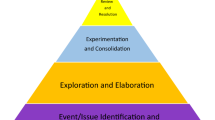Abstract
Fifteen supervisors participated in a program designed to increase their teaching skills. After watching and discussing videotapes of highly rated supervisors, their own teaching styles changed. They became more active teachers: redirecting residents’ attention, focusing on patient material, talking about the technique of psychotherapy and theory of treatment, and commenting on the residents’ countertransference. The supervisors were enthusiastic about the experience, feeling that it strengthened their identity as educators and helped clarify the goals of supervision. Supervision is a job psychiatrists usually assume without any specialized training, and clinicians need help in making the transition from therapist to supervisor.
Similar content being viewed by others
References
Group for the Advancement of Psychiatry: Trends and Issues in Psychiatric Residency Programs, Report No. 31. American Psychiatric Association, 1955.
Ekstein, R., and Wallerstein, R. S.: The Teaching and Learning of Psychotherapy. New York: Basic Books, 1963.
Fleming, J., and Benedict, T.: Psychoanalytic Supervision. New York: Grune & Straton, 1966.
Moulton, R.: Views on the supervisory situation: Multiple dimensions in supervision. My memories of being supervised. Contemporary Psychiatry, 5:146–157, 1969.
Grotjahn, M.: Problems and techniques of supervision. Psychiatry, 18:9–15, 1955.
Goin, M. K., and Kline, F.: Supervision observed. Journal of Nervous and Mental Disorders, 158:208–213, 1974.
Kline, F., Goin, M. K., and Zimmerman, W.: You can be a better supervisor. Journal of Psychiatric Education, 1(2):174–179, 1977.
Goin, M. K., and Kline, F.: Countertransference: A neglected subject in supervision. American Journal of Psychiatry, 133:1, 1976.
Schuster, D. B., Sandt, J. J., and Thaler, O. F.: Clinical Supervision of the Psychiatric Resident. New York: Brunner/Mazel, 1972.
Bucher, R., et al.: Implications of prior socialization for residency programs in psychiatry, Archives of General Psychiatry, 20:395–402, 1969.
Chessick, R.: Why Psychotherapists Fail. New York: Science House, 1971.
Author information
Authors and Affiliations
Additional information
This study was made possible by a grant from the Professional Staff Association, Los Angeles County-University of Southern California Medical Center.
Rights and permissions
About this article
Cite this article
Goin, M.K., Kline, F. & Zimmerman, W. The Use of Videotape in Teaching Supervision. Acad Psychiatry 2, 189–196 (1978). https://doi.org/10.1007/BF03399711
Published:
Issue Date:
DOI: https://doi.org/10.1007/BF03399711



